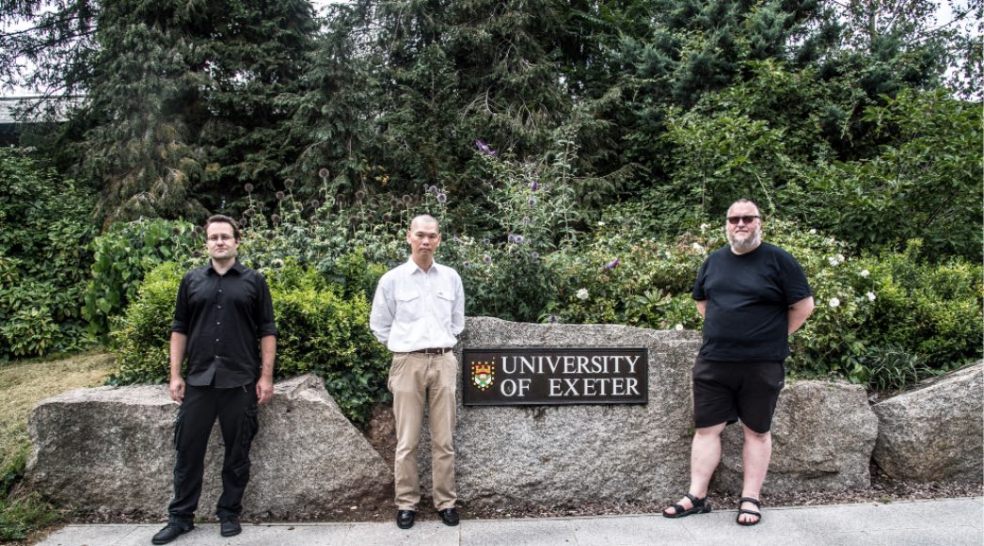
Exeter experts receive prestigious Royal Academy of Engineering award for work to tackle COVID-19
Experts from the University of Exeter’s Centre for Water Systems (CWS), have received a prestigious award for their exceptional engineering acheivements in tackling COVID-19.
Professor Dragan Savic FREng, Dr Lydia Vamvakeridou-Lyroudia, Professor Albert Chen, Dr Mehdi Khoury and Mr Gareth Lewis, from Exeter’s College of Engineering, Mathematics and Physical Sciences, have received the Royal Academy of Engineering President’s Special Award for Pandemic Service, announced today (Monday 17th August)
The awards have been made to teams, organisations, individuals, collaborations and projects across all technical specialities, disciplines and career stages within the UK engineering community who have contributed to addressing the challenges of the COVID-19 pandemic.
Specially commissioned silver medals will be presented to all 19 winners from across the UK later this year.
The team’s success was due to their pivotal work in the Sewers4COVID project that developed an original approach for early detection of the SARS-CoV-2 virus by analysing wastewater.
The project could enable experts to quantify the presence of the virus in the population without the need for extensive and expensive individual testing.
Dr Mehdi Khoury, a Senior Research Fellow at CWS, said: “The early warning detection of pathogens from sewers is but the first step. Next come the ability to give different people at various locations specific supplies and tasks so as to fight the pandemic better, similarly to the way surgeons or pilots are supplied a checklist of actions to take when facing a problem.”
Detecting the presence of coronavirus SARS-CoV-2 in the population is vital to control it, but individual testing can be expensive and invasive. The CWS team at the University of Exeter, in collaboration with scientists from the Netherlands, Greece and Spain, developed a fresh approach Sewers4COVID for early detection of the SARS-CoV-2 virus by tapping into sewers.
They use wastewater-based epidemiology, which involves analysing sewage samples on a daily basis. This practice provides data for DNA sequencing technology using real-time quantitative polymerase chain reaction (RT qPCR).
By applying machine learning techniques to the sewer surveillance data, Sewers4COVID can detect hotspots of potential outbreaks in real time. The method also takes into consideration socioeconomic conditions, to identify vulnerable groups that are at high risk. The result is an estimate of the number of infected people in the area covered by the sewer system.
This ingenious approach was conceived in just 48 hours when the Exeter engineers competed with more than 2,000 other teams in the #EUvsVirus hackathon organised by the European Commission in April. Collaborating online , the team developed the methodology and a powerful prototype of a digital pandemic observatory at a countrywide scale in the Netherlands.
Dr Lydia Vamvakeridou-Lyroudia, a Senior Research Fellow at CWS, said: “Sewers4COVID shows the need (and the strength) of team work and collaboration at interdisciplinary and international level, so as to be able to face pandemics like COVID-19 that affect us all. Let's hope that there will be a follow-up to be implemented in many countries.”
The team plans to develop the methodology into a decision support system to help experts choose the most effective mitigation measures to prevent or reduce the impact of future pandemics.
Together with partners in Asia and South America, the Exeter team is planning to adapt the Sewers4COVID approach for use in lower and middle-income countries with significantly different wastewater infrastructure, environmental and socioeconomic characteristics from European countries.
The team is also part of the Europe-wide initiative “SARS-CoV-2 Surveillance employing Sewers EU Umbrella Study” by the EU Joint Research Centre (JRC) to apply the concept to more than 90 wastewater treatment plants across the EU.













